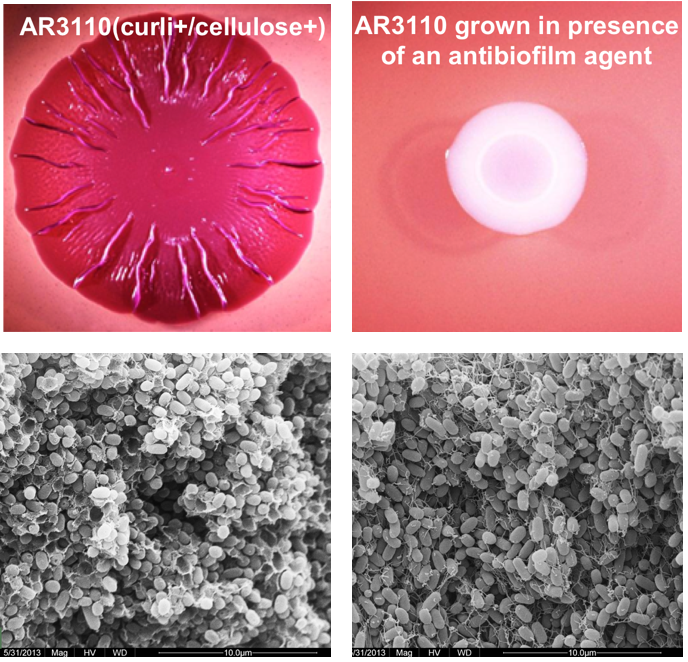.

Anti-biofilm compounds from natural sources
Bacteria in biofilms are highly resistant against antibiotics, disinfectants and the attacks of the immune system. As a consequence, biofilm formation is often associated with chronic infections or bacterial colonisation of medical implants that are refractory to antibiotic treatment. In addition, some biofilm-related proteins as e.g. curli fibres are highly inflammatory. Thus, high expression of CsgD and curli fibres observed in the German outbreak E. coli O104:H4 strain at 37oC may have contributed to inflammation and the high incidence of progression to haemolytic uremic syndrome. Furthermore, biofilms grow on all kinds of submerged surfaces in technical environments which can result in major damage and financial losses.
For all these reasons, anti-biofilm compounds are sought after intensively. Promising targets are general biofilm features such as amyloid fibre formation in the biofilm matrix of many species or the ubiquitous c-di-GMP synthesis. Since living organisms are likely to protect themselves against being colonized by bacterial biofilms, one may expect to find compounds with anti-biofilm activities in plants, animals, algae or other microorganisms.
Current work in our group follows the following lines:
- Testing extracts from plants used in traditional herbal medicine for anti-biofilm activity
- Using our 'toolbox' of reporters for regulation and functional aspects of biofilms of E. coli, we try to elucidate the mechanisms of action of active extracts and to identify the active compounds.
Cooperation Partner
Dr. Stefanos Karachalios, Althaea, Anatoli, Crete https://www.althaea.eu.com/
Pruteanu, M., J. I. Hernández Lobato, T. Stach, and R. Hengge (2020) Major plant flavonoids prevent the assembly of amyloid curli fibers and can interfere with bacterial biofilm formation. Environ. Microbiol. 22: 5280-5299. doi: 10.1111/1462-2920.15216
Hengge, R. (2019) Targeting of bacterial biofilms by the green tea polyphenol EGCG. Molecules 24:2403. doi: 10.3390/molecules24132403
Serra, D.O., F. Mika, A.M. Richter, and R. Hengge (2016) The green tea polyphenol EGCG inhibits E. coli biofilm formation by impairing amyloid curli fibre assembly and downregulating the biofilm regulator CsgD via the σE-dependent sRNA RybB. Mol. Microbiol., 101, 136–151.
